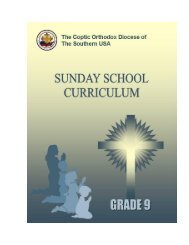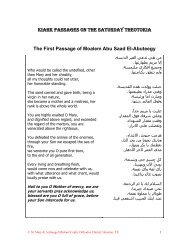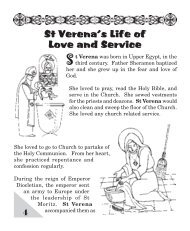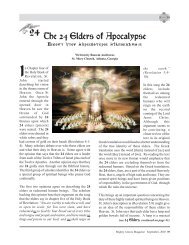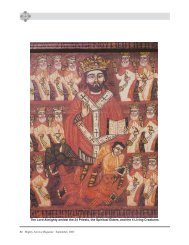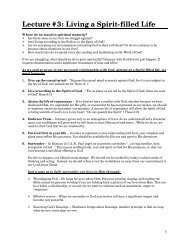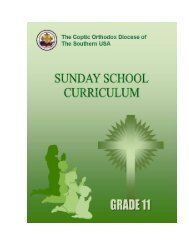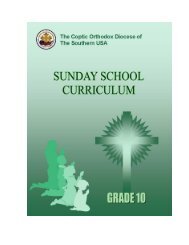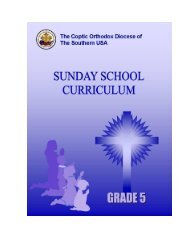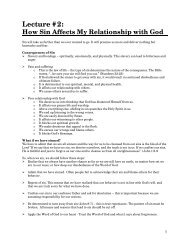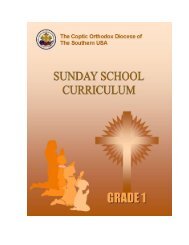Grade 12 - Coptic Orthodox Diocese of the Southern United States
Grade 12 - Coptic Orthodox Diocese of the Southern United States
Grade 12 - Coptic Orthodox Diocese of the Southern United States
You also want an ePaper? Increase the reach of your titles
YUMPU automatically turns print PDFs into web optimized ePapers that Google loves.
Sunday School Curriculum <strong>Grade</strong> <strong>12</strong><br />
IV. Second2 Timothy<br />
St. Paul wrote it while he was in prison in Rome to Timothy in Ephesus. St. Paul was about to<br />
meet his death (4:6). For that reason, he wrote this letter to give final instructions to Timothy:<br />
a) To endure <strong>the</strong> difficulties.<br />
b) To be faithful.<br />
c) To fulfill his duties in enduring with <strong>the</strong> Gospel.<br />
d) To remind him that God gives us a Spirit <strong>of</strong> power and not <strong>of</strong> fear.<br />
e) To admonish him and give him a charge to teach and practice correctly.<br />
f) To encourage him to ―exhort, convince, rebuke‖(4:2).<br />
The four things that St. Paul asked <strong>of</strong> Timothy as St. Paul approached death were:<br />
1) Friends, 2) Cloak, 3) Books, 4) Parchments (4:2)<br />
In this epistle, St. Paul mentioned so many people whom we have never met anywhere else in <strong>the</strong><br />
Bible.<br />
V. Titus<br />
St. Paul wrote this epistle from Macedonia to Titus in Crete. Titus was also facing several<br />
difficulties just like Timothy. The heresy that was attacking <strong>the</strong> Church in Crete dealt with<br />
circumcision, Jewish myth, and <strong>the</strong> observances <strong>of</strong> <strong>the</strong> law. Verse <strong>12</strong> in Chapter 3 talks about a<br />
meeting that St. Paul had planned with Titus. No one knows if this meeting ever took place. Some<br />
<strong>the</strong>ologians believe that St. Paul wrote <strong>the</strong> Epistle to Titus before he wrote Second Timothy. It is said<br />
that Titus became a Christian because <strong>of</strong> St. Paul‘s testimony.<br />
VI. Hebrews<br />
Many Jewish believers, having stepped out <strong>of</strong> Judaism into Christianity, want to reverse <strong>the</strong>ir<br />
course in order to escape persecution by <strong>the</strong>ir countrymen. St. Paul exhorts <strong>the</strong> Hebrews to “go to<br />
perfection” (6:1). His appeal is based on <strong>the</strong> superiority <strong>of</strong> Christ over <strong>the</strong> Judaic system. Christ is<br />
better than <strong>the</strong> angels, for <strong>the</strong>y worship Him. He is better than Moses, for He created him. He is better<br />
than <strong>the</strong> Aaronic priesthood, for His sacrifice was once for all time. He is better than <strong>the</strong> law, for He<br />
mediates a better covenant. In short, <strong>the</strong>re is more to be gained in Christ than to be lost in Judaism.<br />
Pressing on in Christ produces tested faith, self-discipline, and a visible love seen in good works. The<br />
Epistle to <strong>the</strong> Hebrews seems to be written before 70 AD.<br />
Conclusion:<br />
It is <strong>of</strong> more benefit to learn about each epistle before studying <strong>the</strong> epistle. Learning about <strong>the</strong><br />
time, <strong>the</strong> occasion, <strong>the</strong> purpose, <strong>the</strong> difficulties that <strong>the</strong> Churches were facing, will help us to have a<br />
better understanding <strong>of</strong> what St. Paul said and why.<br />
Applications:<br />
It might be more efficient if everyone in <strong>the</strong> Sunday school class gets a copy <strong>of</strong> <strong>the</strong> lesson so<br />
that <strong>the</strong>y may use it as <strong>the</strong>y study <strong>the</strong> different epistles <strong>of</strong> St. Paul later on.<br />
THE GREAT FAST 135



